Correctional Officer Resume Examples

Mar 31, 2025
|
12 min read
Unlock the key to crafting an outstanding correctional officer resume that opens doors. Showcase your skills, experience, and character to stand guard in the job market. Make each section a tool in your job-seeking arsenal.
Rated by 348 people
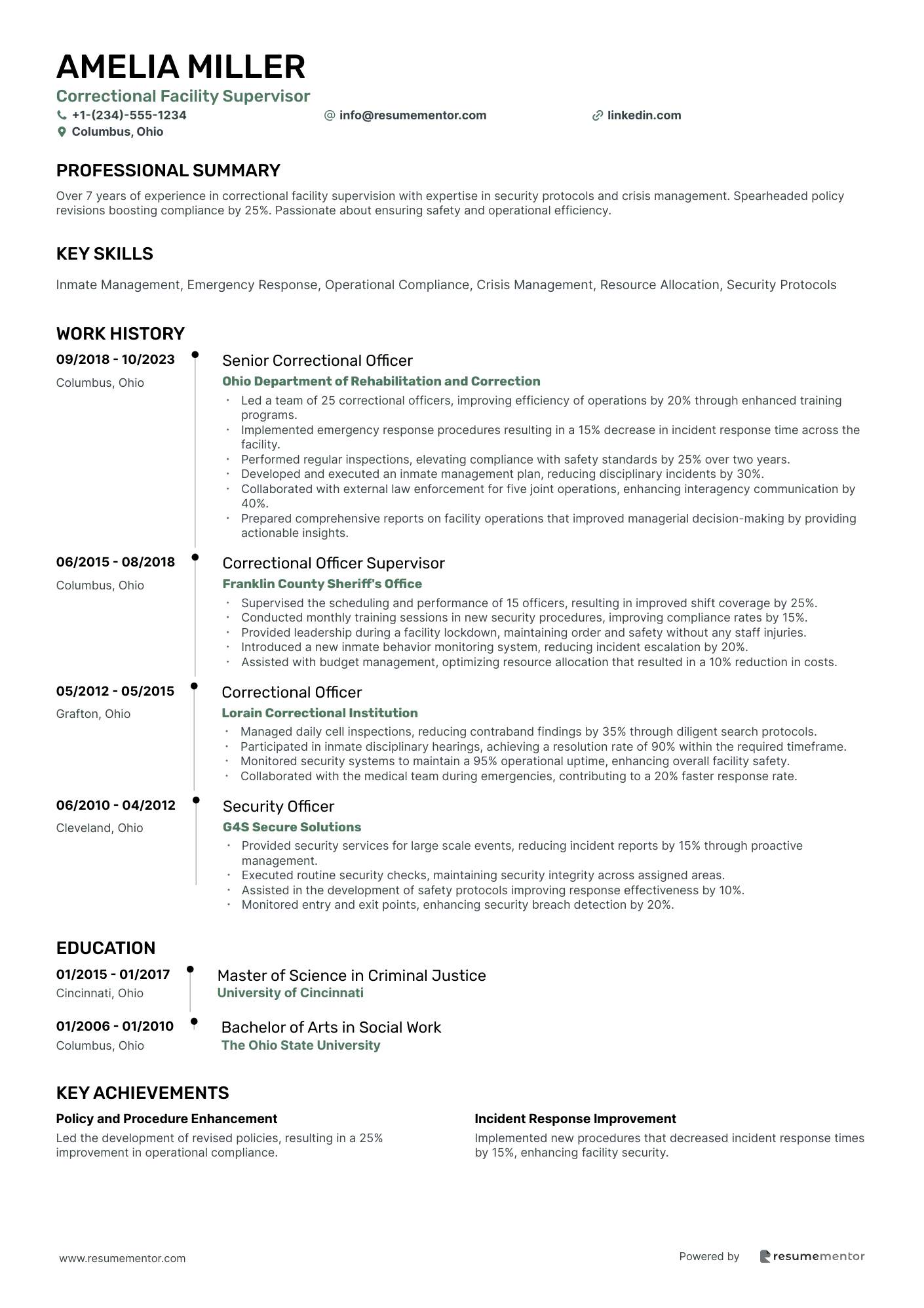
Correctional Facility Supervisor
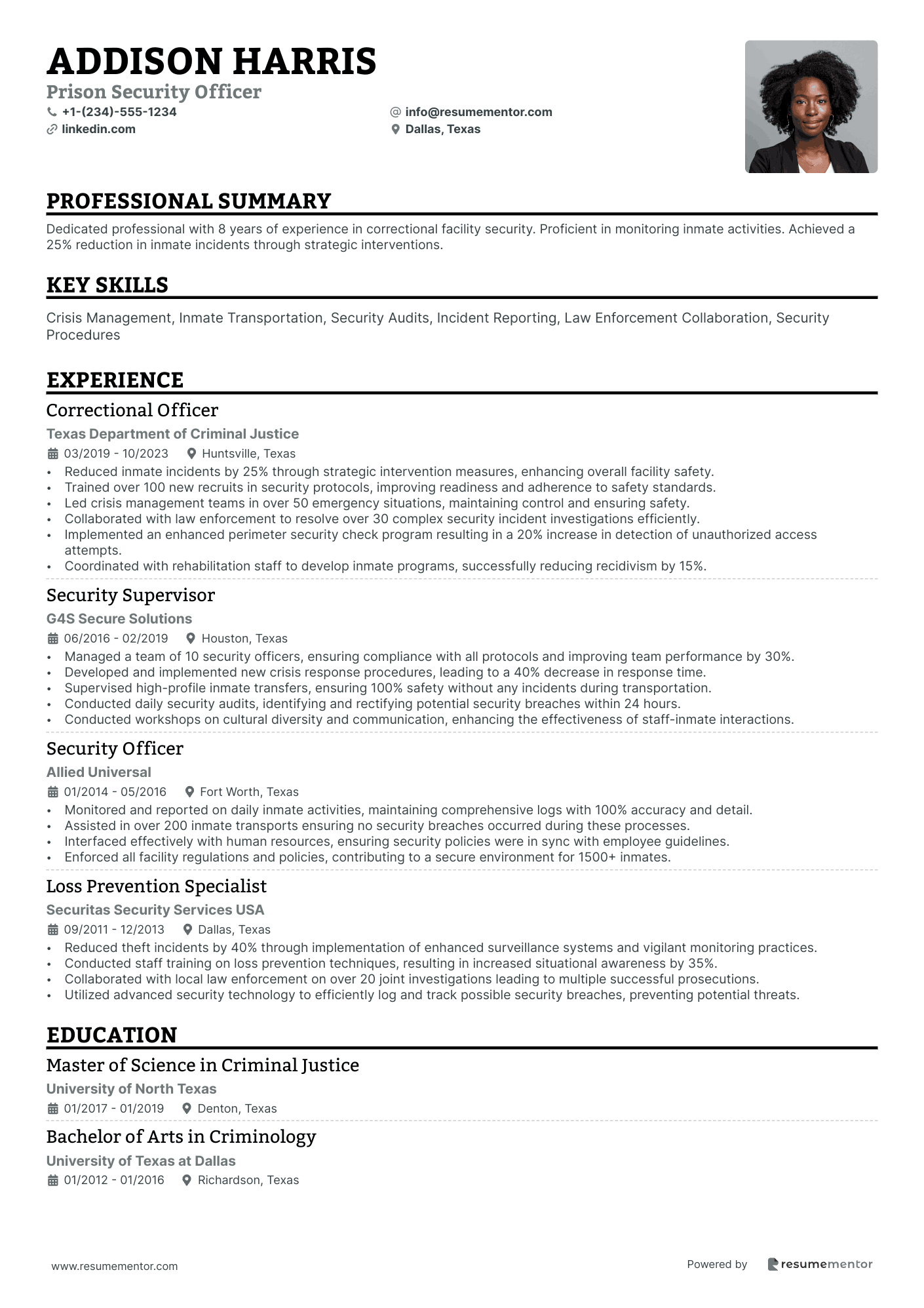
Prison Security Officer
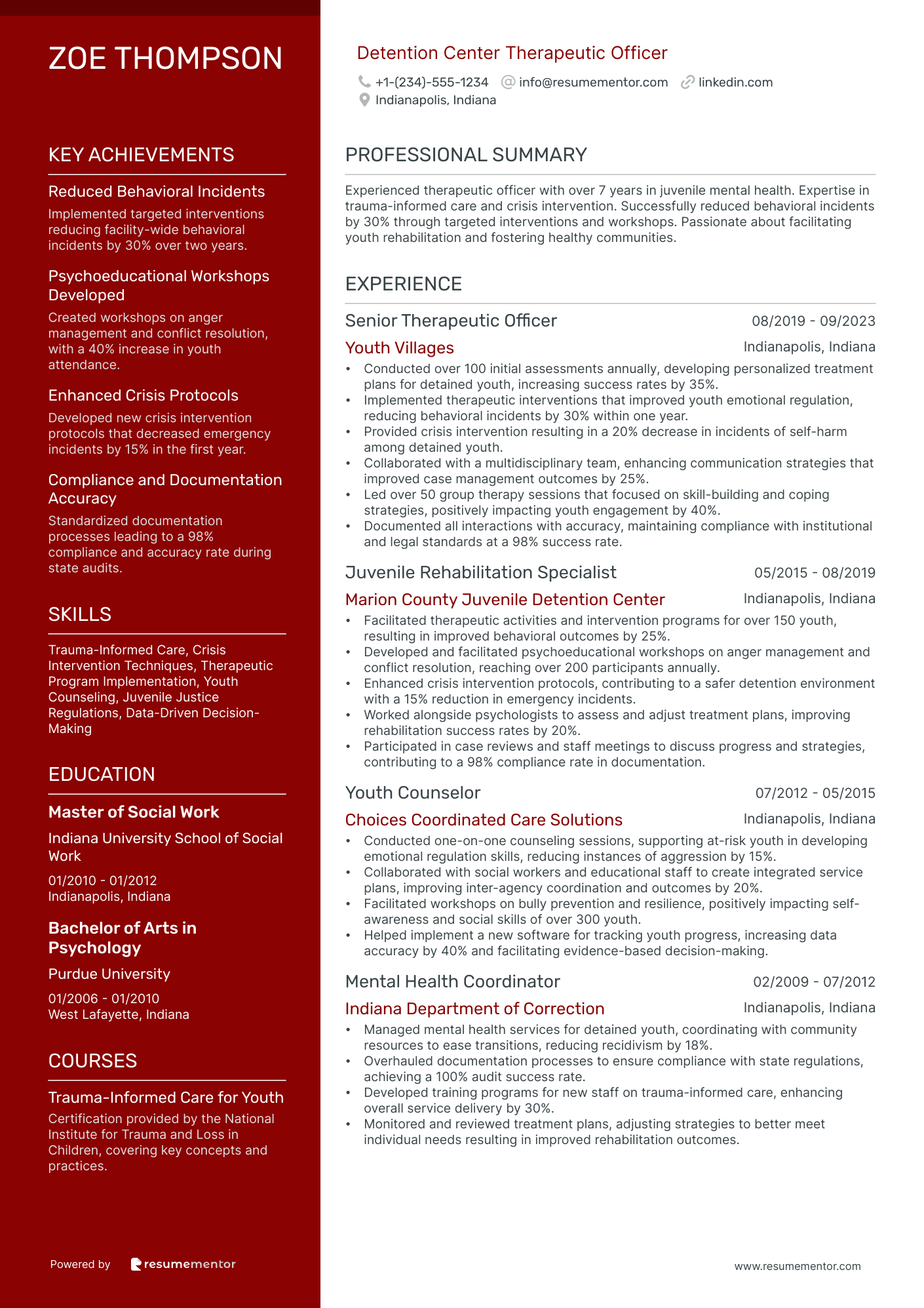
Detention Center Therapeutic Officer
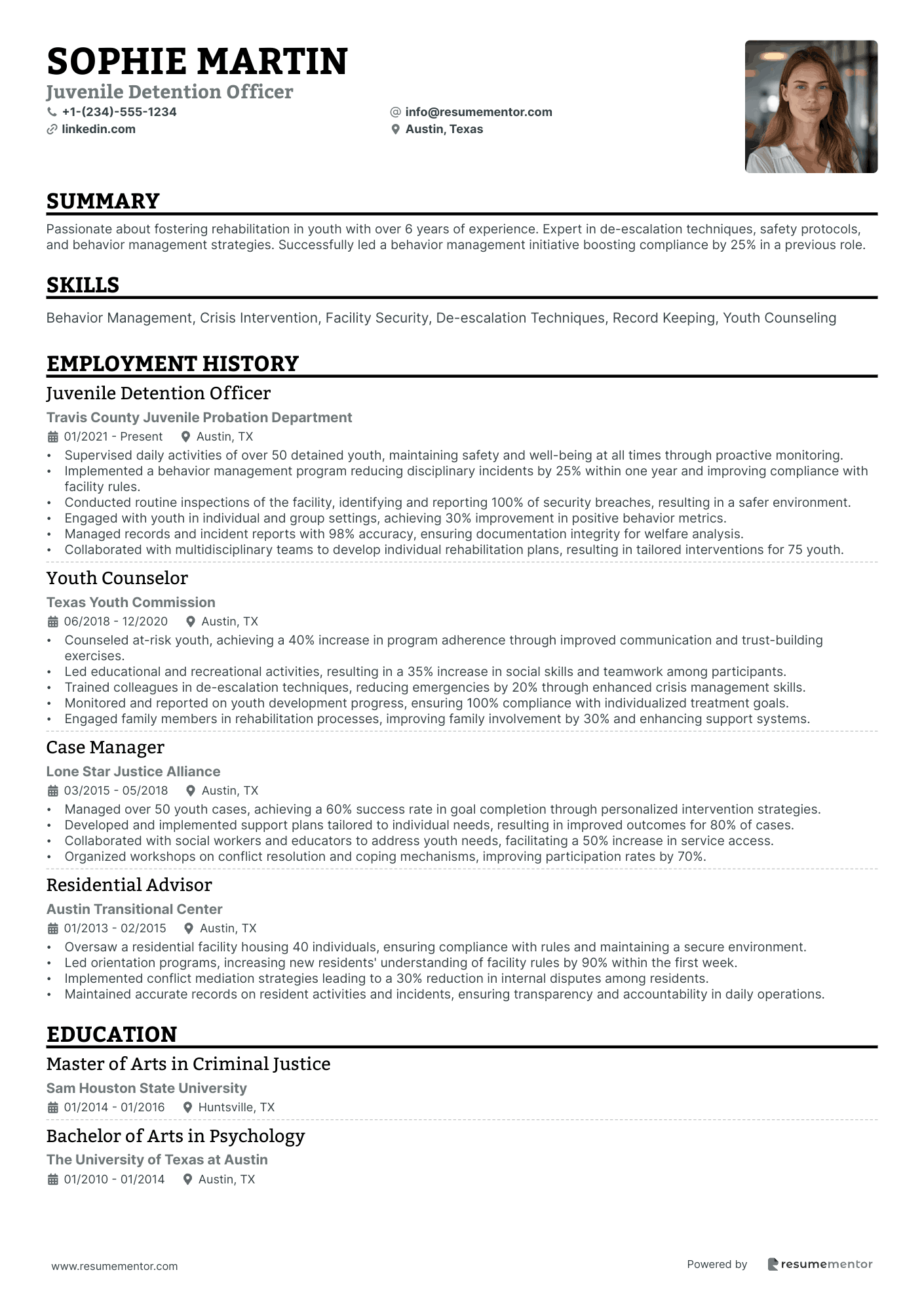
Juvenile Detention Officer
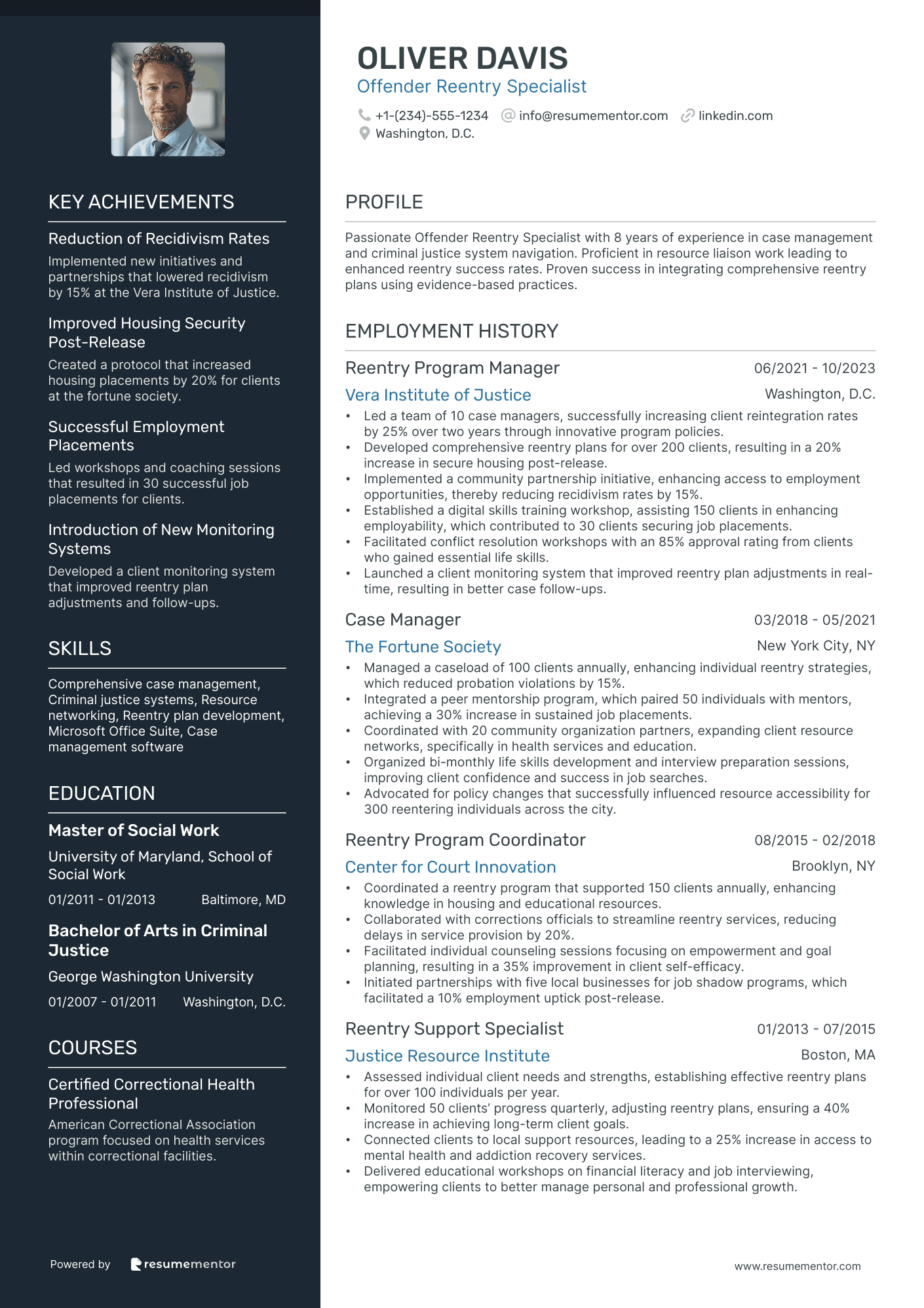
Offender Reentry Specialist
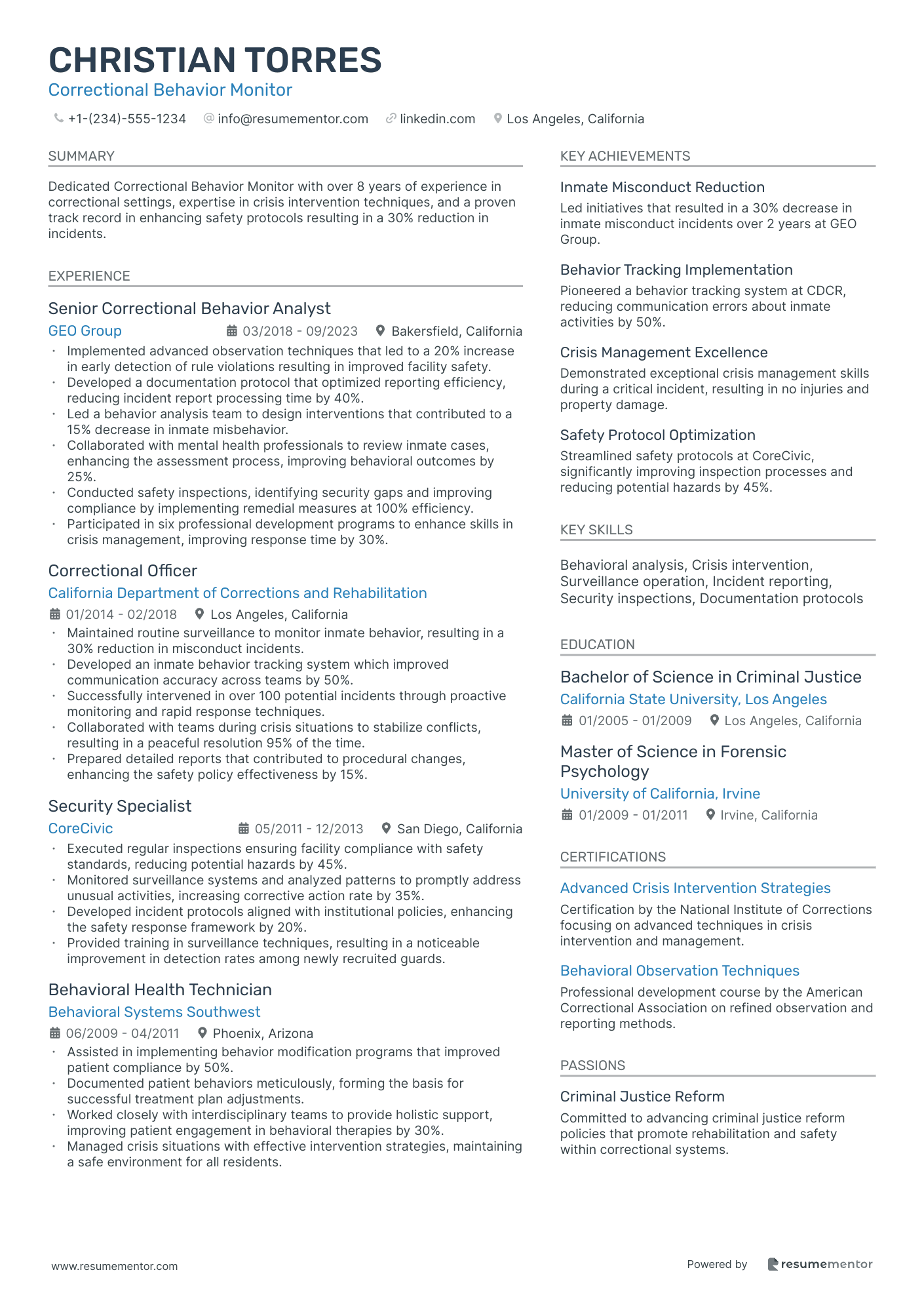
Correctional Behavior Monitor
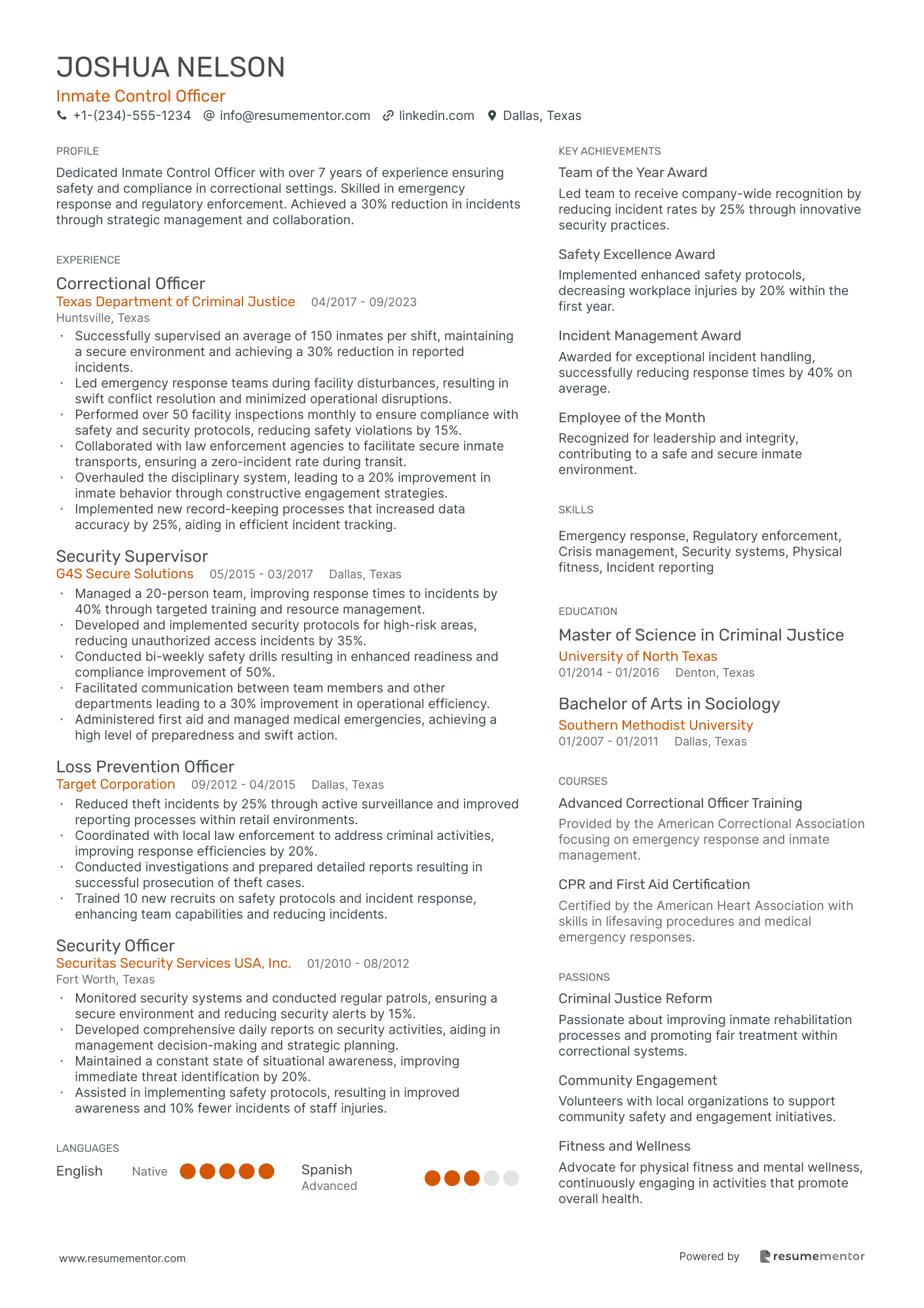
Inmate Control Officer
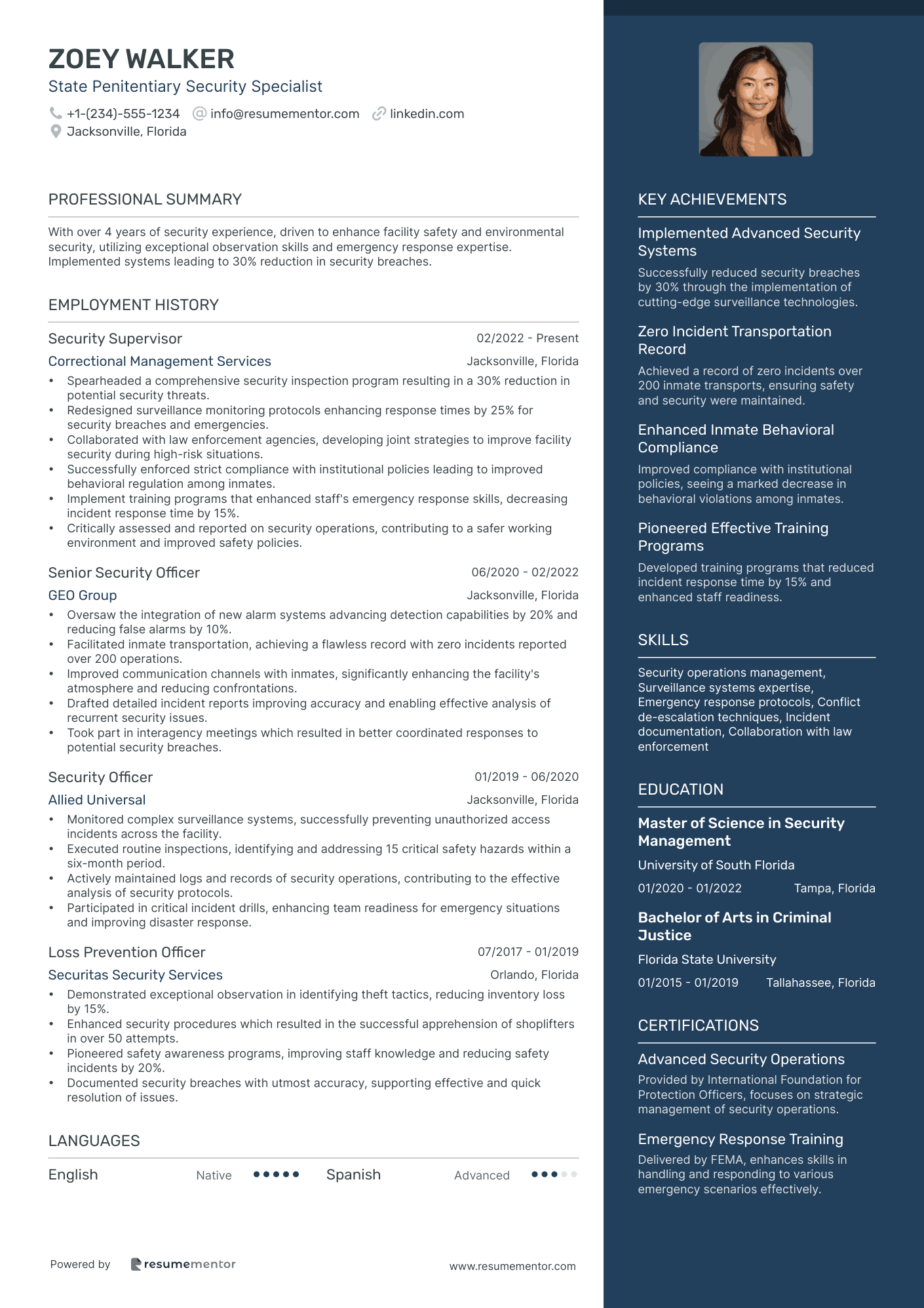
State Penitentiary Security Specialist
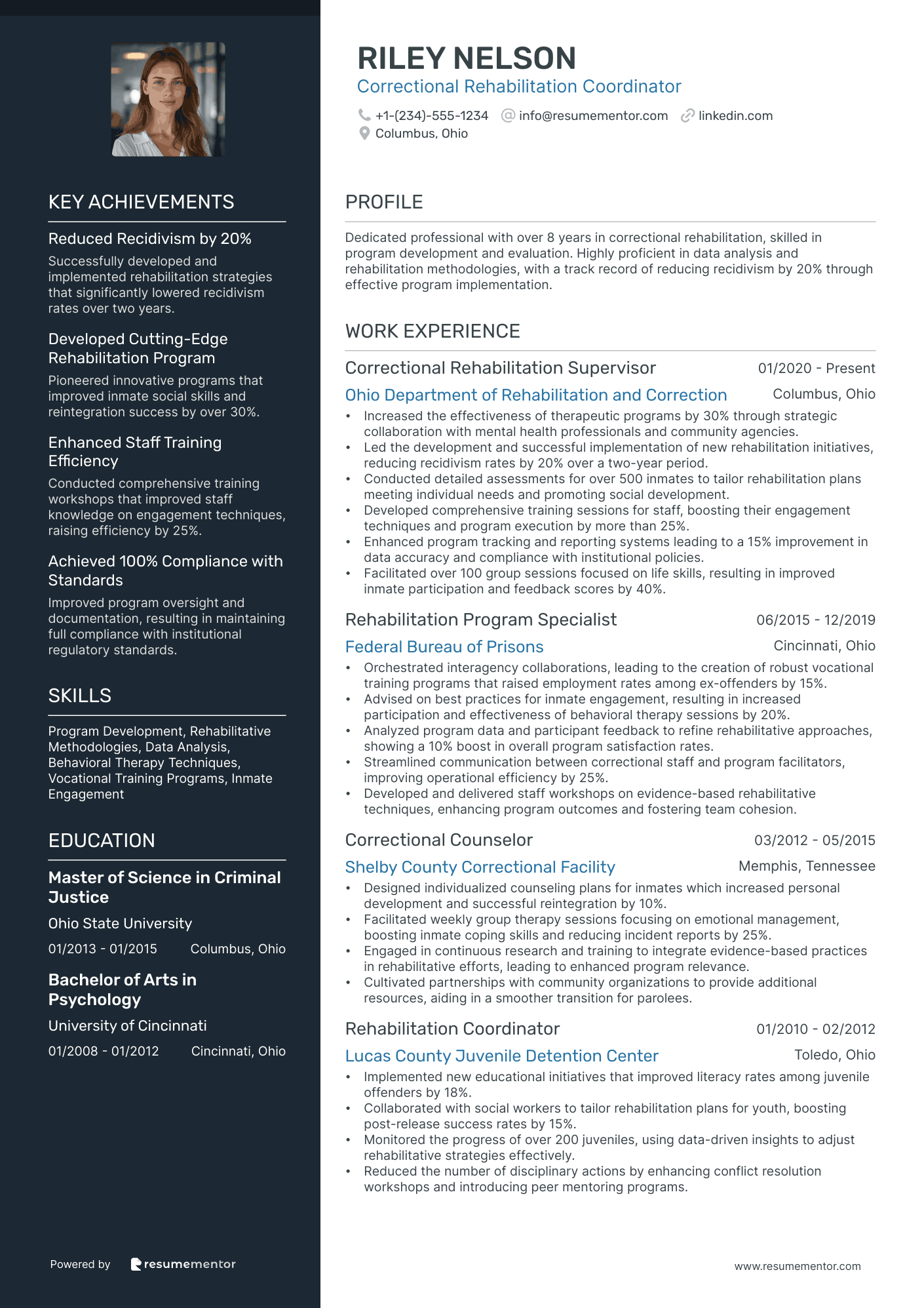
Correctional Rehabilitation Coordinator
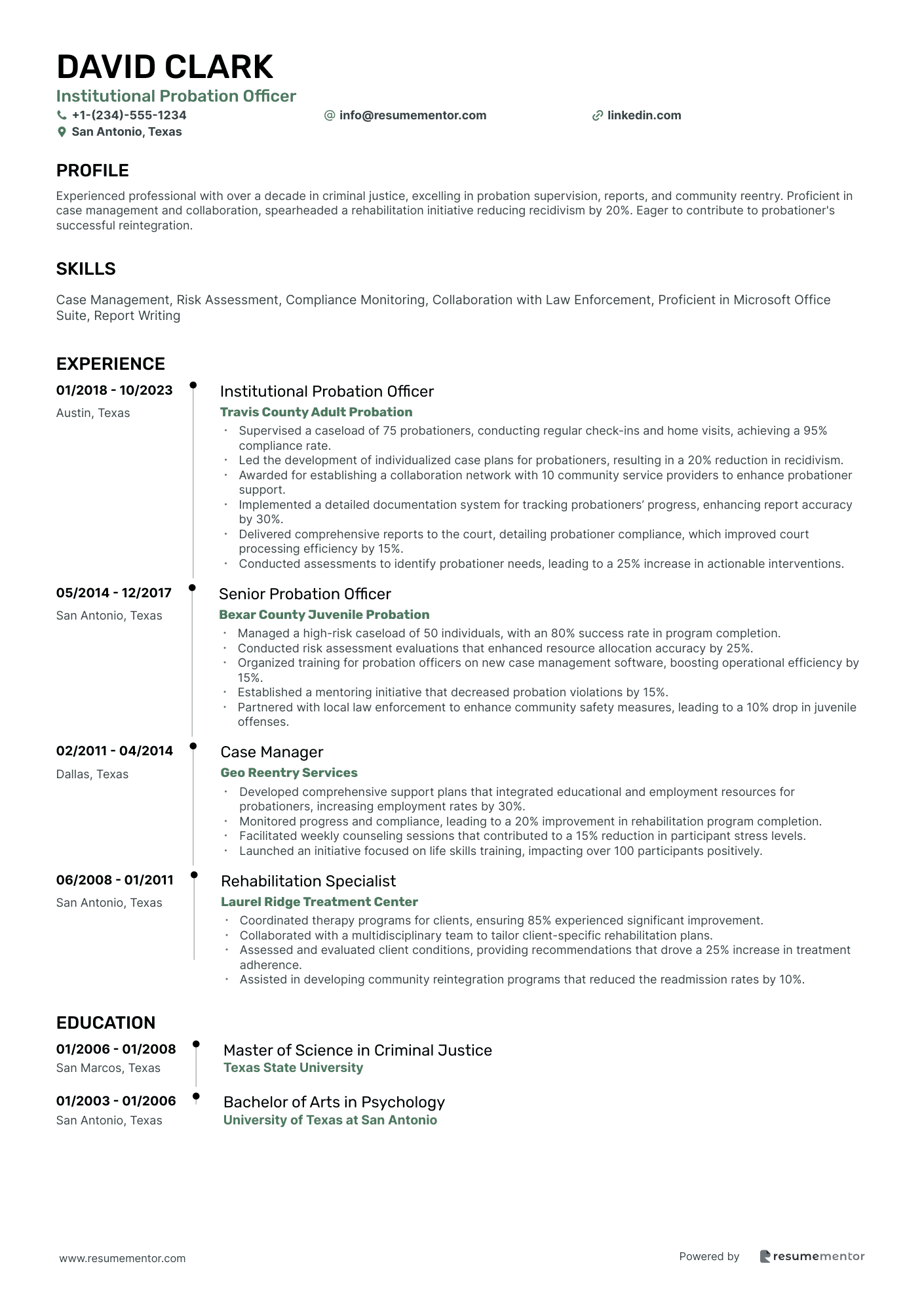
Institutional Probation Officer

Correctional Facility Supervisor resume sample
- •Led a team of 25 correctional officers, improving efficiency of operations by 20% through enhanced training programs.
- •Implemented emergency response procedures resulting in a 15% decrease in incident response time across the facility.
- •Performed regular inspections, elevating compliance with safety standards by 25% over two years.
- •Developed and executed an inmate management plan, reducing disciplinary incidents by 30%.
- •Collaborated with external law enforcement for five joint operations, enhancing interagency communication by 40%.
- •Prepared comprehensive reports on facility operations that improved managerial decision-making by providing actionable insights.
- •Supervised the scheduling and performance of 15 officers, resulting in improved shift coverage by 25%.
- •Conducted monthly training sessions in new security procedures, improving compliance rates by 15%.
- •Provided leadership during a facility lockdown, maintaining order and safety without any staff injuries.
- •Introduced a new inmate behavior monitoring system, reducing incident escalation by 20%.
- •Assisted with budget management, optimizing resource allocation that resulted in a 10% reduction in costs.
- •Managed daily cell inspections, reducing contraband findings by 35% through diligent search protocols.
- •Participated in inmate disciplinary hearings, achieving a resolution rate of 90% within the required timeframe.
- •Monitored security systems to maintain a 95% operational uptime, enhancing overall facility safety.
- •Collaborated with the medical team during emergencies, contributing to a 20% faster response rate.
- •Provided security services for large scale events, reducing incident reports by 15% through proactive management.
- •Executed routine security checks, maintaining security integrity across assigned areas.
- •Assisted in the development of safety protocols improving response effectiveness by 10%.
- •Monitored entry and exit points, enhancing security breach detection by 20%.
Prison Security Officer resume sample
- •Reduced inmate incidents by 25% through strategic intervention measures, enhancing overall facility safety.
- •Trained over 100 new recruits in security protocols, improving readiness and adherence to safety standards.
- •Led crisis management teams in over 50 emergency situations, maintaining control and ensuring safety.
- •Collaborated with law enforcement to resolve over 30 complex security incident investigations efficiently.
- •Implemented an enhanced perimeter security check program resulting in a 20% increase in detection of unauthorized access attempts.
- •Coordinated with rehabilitation staff to develop inmate programs, successfully reducing recidivism by 15%.
- •Managed a team of 10 security officers, ensuring compliance with all protocols and improving team performance by 30%.
- •Developed and implemented new crisis response procedures, leading to a 40% decrease in response time.
- •Supervised high-profile inmate transfers, ensuring 100% safety without any incidents during transportation.
- •Conducted daily security audits, identifying and rectifying potential security breaches within 24 hours.
- •Conducted workshops on cultural diversity and communication, enhancing the effectiveness of staff-inmate interactions.
- •Monitored and reported on daily inmate activities, maintaining comprehensive logs with 100% accuracy and detail.
- •Assisted in over 200 inmate transports ensuring no security breaches occurred during these processes.
- •Interfaced effectively with human resources, ensuring security policies were in sync with employee guidelines.
- •Enforced all facility regulations and policies, contributing to a secure environment for 1500+ inmates.
- •Reduced theft incidents by 40% through implementation of enhanced surveillance systems and vigilant monitoring practices.
- •Conducted staff training on loss prevention techniques, resulting in increased situational awareness by 35%.
- •Collaborated with local law enforcement on over 20 joint investigations leading to multiple successful prosecutions.
- •Utilized advanced security technology to efficiently log and track possible security breaches, preventing potential threats.
Detention Center Therapeutic Officer resume sample
- •Conducted over 100 initial assessments annually, developing personalized treatment plans for detained youth, increasing success rates by 35%.
- •Implemented therapeutic interventions that improved youth emotional regulation, reducing behavioral incidents by 30% within one year.
- •Provided crisis intervention resulting in a 20% decrease in incidents of self-harm among detained youth.
- •Collaborated with a multidisciplinary team, enhancing communication strategies that improved case management outcomes by 25%.
- •Led over 50 group therapy sessions that focused on skill-building and coping strategies, positively impacting youth engagement by 40%.
- •Documented all interactions with accuracy, maintaining compliance with institutional and legal standards at a 98% success rate.
- •Facilitated therapeutic activities and intervention programs for over 150 youth, resulting in improved behavioral outcomes by 25%.
- •Developed and facilitated psychoeducational workshops on anger management and conflict resolution, reaching over 200 participants annually.
- •Enhanced crisis intervention protocols, contributing to a safer detention environment with a 15% reduction in emergency incidents.
- •Worked alongside psychologists to assess and adjust treatment plans, improving rehabilitation success rates by 20%.
- •Participated in case reviews and staff meetings to discuss progress and strategies, contributing to a 98% compliance rate in documentation.
- •Conducted one-on-one counseling sessions, supporting at-risk youth in developing emotional regulation skills, reducing instances of aggression by 15%.
- •Collaborated with social workers and educational staff to create integrated service plans, improving inter-agency coordination and outcomes by 20%.
- •Facilitated workshops on bully prevention and resilience, positively impacting self-awareness and social skills of over 300 youth.
- •Helped implement a new software for tracking youth progress, increasing data accuracy by 40% and facilitating evidence-based decision-making.
- •Managed mental health services for detained youth, coordinating with community resources to ease transitions, reducing recidivism by 18%.
- •Overhauled documentation processes to ensure compliance with state regulations, achieving a 100% audit success rate.
- •Developed training programs for new staff on trauma-informed care, enhancing overall service delivery by 30%.
- •Monitored and reviewed treatment plans, adjusting strategies to better meet individual needs resulting in improved rehabilitation outcomes.
Juvenile Detention Officer resume sample
- •Supervised daily activities of over 50 detained youth, maintaining safety and well-being at all times through proactive monitoring.
- •Implemented a behavior management program reducing disciplinary incidents by 25% within one year and improving compliance with facility rules.
- •Conducted routine inspections of the facility, identifying and reporting 100% of security breaches, resulting in a safer environment.
- •Engaged with youth in individual and group settings, achieving 30% improvement in positive behavior metrics.
- •Managed records and incident reports with 98% accuracy, ensuring documentation integrity for welfare analysis.
- •Collaborated with multidisciplinary teams to develop individual rehabilitation plans, resulting in tailored interventions for 75 youth.
- •Counseled at-risk youth, achieving a 40% increase in program adherence through improved communication and trust-building exercises.
- •Led educational and recreational activities, resulting in a 35% increase in social skills and teamwork among participants.
- •Trained colleagues in de-escalation techniques, reducing emergencies by 20% through enhanced crisis management skills.
- •Monitored and reported on youth development progress, ensuring 100% compliance with individualized treatment goals.
- •Engaged family members in rehabilitation processes, improving family involvement by 30% and enhancing support systems.
- •Managed over 50 youth cases, achieving a 60% success rate in goal completion through personalized intervention strategies.
- •Developed and implemented support plans tailored to individual needs, resulting in improved outcomes for 80% of cases.
- •Collaborated with social workers and educators to address youth needs, facilitating a 50% increase in service access.
- •Organized workshops on conflict resolution and coping mechanisms, improving participation rates by 70%.
- •Oversaw a residential facility housing 40 individuals, ensuring compliance with rules and maintaining a secure environment.
- •Led orientation programs, increasing new residents' understanding of facility rules by 90% within the first week.
- •Implemented conflict mediation strategies leading to a 30% reduction in internal disputes among residents.
- •Maintained accurate records on resident activities and incidents, ensuring transparency and accountability in daily operations.
Offender Reentry Specialist resume sample
- •Led a team of 10 case managers, successfully increasing client reintegration rates by 25% over two years through innovative program policies.
- •Developed comprehensive reentry plans for over 200 clients, resulting in a 20% increase in secure housing post-release.
- •Implemented a community partnership initiative, enhancing access to employment opportunities, thereby reducing recidivism rates by 15%.
- •Established a digital skills training workshop, assisting 150 clients in enhancing employability, which contributed to 30 clients securing job placements.
- •Facilitated conflict resolution workshops with an 85% approval rating from clients who gained essential life skills.
- •Launched a client monitoring system that improved reentry plan adjustments in real-time, resulting in better case follow-ups.
- •Managed a caseload of 100 clients annually, enhancing individual reentry strategies, which reduced probation violations by 15%.
- •Integrated a peer mentorship program, which paired 50 individuals with mentors, achieving a 30% increase in sustained job placements.
- •Coordinated with 20 community organization partners, expanding client resource networks, specifically in health services and education.
- •Organized bi-monthly life skills development and interview preparation sessions, improving client confidence and success in job searches.
- •Advocated for policy changes that successfully influenced resource accessibility for 300 reentering individuals across the city.
- •Coordinated a reentry program that supported 150 clients annually, enhancing knowledge in housing and educational resources.
- •Collaborated with corrections officials to streamline reentry services, reducing delays in service provision by 20%.
- •Facilitated individual counseling sessions focusing on empowerment and goal planning, resulting in a 35% improvement in client self-efficacy.
- •Initiated partnerships with five local businesses for job shadow programs, which facilitated a 10% employment uptick post-release.
- •Assessed individual client needs and strengths, establishing effective reentry plans for over 100 individuals per year.
- •Monitored 50 clients’ progress quarterly, adjusting reentry plans, ensuring a 40% increase in achieving long-term client goals.
- •Connected clients to local support resources, leading to a 25% increase in access to mental health and addiction recovery services.
- •Delivered educational workshops on financial literacy and job interviewing, empowering clients to better manage personal and professional growth.
Correctional Behavior Monitor resume sample
- •Implemented advanced observation techniques that led to a 20% increase in early detection of rule violations resulting in improved facility safety.
- •Developed a documentation protocol that optimized reporting efficiency, reducing incident report processing time by 40%.
- •Led a behavior analysis team to design interventions that contributed to a 15% decrease in inmate misbehavior.
- •Collaborated with mental health professionals to review inmate cases, enhancing the assessment process, improving behavioral outcomes by 25%.
- •Conducted safety inspections, identifying security gaps and improving compliance by implementing remedial measures at 100% efficiency.
- •Participated in six professional development programs to enhance skills in crisis management, improving response time by 30%.
- •Maintained routine surveillance to monitor inmate behavior, resulting in a 30% reduction in misconduct incidents.
- •Developed an inmate behavior tracking system which improved communication accuracy across teams by 50%.
- •Successfully intervened in over 100 potential incidents through proactive monitoring and rapid response techniques.
- •Collaborated with teams during crisis situations to stabilize conflicts, resulting in a peaceful resolution 95% of the time.
- •Prepared detailed reports that contributed to procedural changes, enhancing the safety policy effectiveness by 15%.
- •Executed regular inspections ensuring facility compliance with safety standards, reducing potential hazards by 45%.
- •Monitored surveillance systems and analyzed patterns to promptly address unusual activities, increasing corrective action rate by 35%.
- •Developed incident protocols aligned with institutional policies, enhancing the safety response framework by 20%.
- •Provided training in surveillance techniques, resulting in a noticeable improvement in detection rates among newly recruited guards.
- •Assisted in implementing behavior modification programs that improved patient compliance by 50%.
- •Documented patient behaviors meticulously, forming the basis for successful treatment plan adjustments.
- •Worked closely with interdisciplinary teams to provide holistic support, improving patient engagement in behavioral therapies by 30%.
- •Managed crisis situations with effective intervention strategies, maintaining a safe environment for all residents.
Inmate Control Officer resume sample
- •Successfully supervised an average of 150 inmates per shift, maintaining a secure environment and achieving a 30% reduction in reported incidents.
- •Led emergency response teams during facility disturbances, resulting in swift conflict resolution and minimized operational disruptions.
- •Performed over 50 facility inspections monthly to ensure compliance with safety and security protocols, reducing safety violations by 15%.
- •Collaborated with law enforcement agencies to facilitate secure inmate transports, ensuring a zero-incident rate during transit.
- •Overhauled the disciplinary system, leading to a 20% improvement in inmate behavior through constructive engagement strategies.
- •Implemented new record-keeping processes that increased data accuracy by 25%, aiding in efficient incident tracking.
- •Managed a 20-person team, improving response times to incidents by 40% through targeted training and resource management.
- •Developed and implemented security protocols for high-risk areas, reducing unauthorized access incidents by 35%.
- •Conducted bi-weekly safety drills resulting in enhanced readiness and compliance improvement of 50%.
- •Facilitated communication between team members and other departments leading to a 30% improvement in operational efficiency.
- •Administered first aid and managed medical emergencies, achieving a high level of preparedness and swift action.
- •Reduced theft incidents by 25% through active surveillance and improved reporting processes within retail environments.
- •Coordinated with local law enforcement to address criminal activities, improving response efficiencies by 20%.
- •Conducted investigations and prepared detailed reports resulting in successful prosecution of theft cases.
- •Trained 10 new recruits on safety protocols and incident response, enhancing team capabilities and reducing incidents.
- •Monitored security systems and conducted regular patrols, ensuring a secure environment and reducing security alerts by 15%.
- •Developed comprehensive daily reports on security activities, aiding in management decision-making and strategic planning.
- •Maintained a constant state of situational awareness, improving immediate threat identification by 20%.
- •Assisted in implementing safety protocols, resulting in improved awareness and 10% fewer incidents of staff injuries.
State Penitentiary Security Specialist resume sample
- •Spearheaded a comprehensive security inspection program resulting in a 30% reduction in potential security threats.
- •Redesigned surveillance monitoring protocols enhancing response times by 25% for security breaches and emergencies.
- •Collaborated with law enforcement agencies, developing joint strategies to improve facility security during high-risk situations.
- •Successfully enforced strict compliance with institutional policies leading to improved behavioral regulation among inmates.
- •Implement training programs that enhanced staff's emergency response skills, decreasing incident response time by 15%.
- •Critically assessed and reported on security operations, contributing to a safer working environment and improved safety policies.
- •Oversaw the integration of new alarm systems advancing detection capabilities by 20% and reducing false alarms by 10%.
- •Facilitated inmate transportation, achieving a flawless record with zero incidents reported over 200 operations.
- •Improved communication channels with inmates, significantly enhancing the facility's atmosphere and reducing confrontations.
- •Drafted detailed incident reports improving accuracy and enabling effective analysis of recurrent security issues.
- •Took part in interagency meetings which resulted in better coordinated responses to potential security breaches.
- •Monitored complex surveillance systems, successfully preventing unauthorized access incidents across the facility.
- •Executed routine inspections, identifying and addressing 15 critical safety hazards within a six-month period.
- •Actively maintained logs and records of security operations, contributing to the effective analysis of security protocols.
- •Participated in critical incident drills, enhancing team readiness for emergency situations and improving disaster response.
- •Demonstrated exceptional observation in identifying theft tactics, reducing inventory loss by 15%.
- •Enhanced security procedures which resulted in the successful apprehension of shoplifters in over 50 attempts.
- •Pioneered safety awareness programs, improving staff knowledge and reducing safety incidents by 20%.
- •Documented security breaches with utmost accuracy, supporting effective and quick resolution of issues.
Correctional Rehabilitation Coordinator resume sample
- •Increased the effectiveness of therapeutic programs by 30% through strategic collaboration with mental health professionals and community agencies.
- •Led the development and successful implementation of new rehabilitation initiatives, reducing recidivism rates by 20% over a two-year period.
- •Conducted detailed assessments for over 500 inmates to tailor rehabilitation plans meeting individual needs and promoting social development.
- •Developed comprehensive training sessions for staff, boosting their engagement techniques and program execution by more than 25%.
- •Enhanced program tracking and reporting systems leading to a 15% improvement in data accuracy and compliance with institutional policies.
- •Facilitated over 100 group sessions focused on life skills, resulting in improved inmate participation and feedback scores by 40%.
- •Orchestrated interagency collaborations, leading to the creation of robust vocational training programs that raised employment rates among ex-offenders by 15%.
- •Advised on best practices for inmate engagement, resulting in increased participation and effectiveness of behavioral therapy sessions by 20%.
- •Analyzed program data and participant feedback to refine rehabilitative approaches, showing a 10% boost in overall program satisfaction rates.
- •Streamlined communication between correctional staff and program facilitators, improving operational efficiency by 25%.
- •Developed and delivered staff workshops on evidence-based rehabilitative techniques, enhancing program outcomes and fostering team cohesion.
- •Designed individualized counseling plans for inmates which increased personal development and successful reintegration by 10%.
- •Facilitated weekly group therapy sessions focusing on emotional management, boosting inmate coping skills and reducing incident reports by 25%.
- •Engaged in continuous research and training to integrate evidence-based practices in rehabilitative efforts, leading to enhanced program relevance.
- •Cultivated partnerships with community organizations to provide additional resources, aiding in a smoother transition for parolees.
- •Implemented new educational initiatives that improved literacy rates among juvenile offenders by 18%.
- •Collaborated with social workers to tailor rehabilitation plans for youth, boosting post-release success rates by 15%.
- •Monitored the progress of over 200 juveniles, using data-driven insights to adjust rehabilitative strategies effectively.
- •Reduced the number of disciplinary actions by enhancing conflict resolution workshops and introducing peer mentoring programs.
Institutional Probation Officer resume sample
- •Supervised a caseload of 75 probationers, conducting regular check-ins and home visits, achieving a 95% compliance rate.
- •Led the development of individualized case plans for probationers, resulting in a 20% reduction in recidivism.
- •Awarded for establishing a collaboration network with 10 community service providers to enhance probationer support.
- •Implemented a detailed documentation system for tracking probationers’ progress, enhancing report accuracy by 30%.
- •Delivered comprehensive reports to the court, detailing probationer compliance, which improved court processing efficiency by 15%.
- •Conducted assessments to identify probationer needs, leading to a 25% increase in actionable interventions.
- •Managed a high-risk caseload of 50 individuals, with an 80% success rate in program completion.
- •Conducted risk assessment evaluations that enhanced resource allocation accuracy by 25%.
- •Organized training for probation officers on new case management software, boosting operational efficiency by 15%.
- •Established a mentoring initiative that decreased probation violations by 15%.
- •Partnered with local law enforcement to enhance community safety measures, leading to a 10% drop in juvenile offenses.
- •Developed comprehensive support plans that integrated educational and employment resources for probationers, increasing employment rates by 30%.
- •Monitored progress and compliance, leading to a 20% improvement in rehabilitation program completion.
- •Facilitated weekly counseling sessions that contributed to a 15% reduction in participant stress levels.
- •Launched an initiative focused on life skills training, impacting over 100 participants positively.
- •Coordinated therapy programs for clients, ensuring 85% experienced significant improvement.
- •Collaborated with a multidisciplinary team to tailor client-specific rehabilitation plans.
- •Assessed and evaluated client conditions, providing recommendations that drove a 25% increase in treatment adherence.
- •Assisted in developing community reintegration programs that reduced the readmission rates by 10%.
As a correctional officer, you are the guardian of order, balancing strength and diplomacy in a demanding environment. Transforming this unique skill set into a compelling resume can be challenging, especially when trying to effectively convey your expertise in managing security protocols and fostering positive interactions with inmates. Yet, successfully presenting your skills is crucial for your career advancement.
Think of your resume as more than just a list—it's your bridge to new opportunities. Crafting a strong document helps you stand out in a competitive job market, where employers are eager to see how your experiences can enhance their facility. This is where a resume template becomes incredibly useful, offering a structure that ensures your achievements take center stage. Explore these resume templates to find one that aligns with your career goals.
A well-organized resume showcases your professionalism and attention to detail. It goes beyond listing duties to highlight your real impact, demonstrating the daily difference you make. By emphasizing your role as a cornerstone of safety and leadership, you lay a solid foundation for future opportunities. Focus on clarity, showing how your unique skills can solve problems and improve operations. By the end of this guide, you will be prepared to present yourself confidently as a skilled correctional officer ready to embrace new challenges.
Key Takeaways
- Effectively presenting correctional officer skills and experiences on a resume is essential for standing out in the job market and advancing one's career.
- Organizing the resume in a clear and professional manner, using a reverse chronological format, and focusing on quantifiable achievements can enhance its impact.
- Highlighting skills like conflict resolution, emergency response, and leadership, as well as relevant certifications, supports one's readiness for correctional officer roles.
- Including relevant education, such as criminal justice training, and certificates in crisis management or conflict resolution, adds value to the resume.
- Optional sections like languages spoken, volunteer work, or hobbies can provide a more comprehensive view of a candidate's qualifications and character.
What to focus on when writing your correctional officer resume
Your correctional officer resume should clearly demonstrate your ability to maintain safety, security, and order within correctional facilities, showcasing your skills in conflict resolution, observation, and law enforcement. Highlighting specific scenarios where you’ve successfully supervised inmates and managed crisis situations is crucial to stand out to recruiters—crafting a resume that effectively communicates these skills involves proper organization and clarity. Below, we'll delve into each section to guide you through the process.
How to structure your correctional officer resume
- Contact Information — This section sets the stage for the entire resume. It’s vital to have your name, phone number, email, and location prominently displayed and current. This ensures that recruiters can easily reach out to you, reinforcing the importance of first impressions—a clear, professional layout here will facilitate further exploration into your qualifications.
- Professional Summary — This is your chance to capture the reader’s attention with a snapshot of your most relevant experiences and skills. Focus on key achievements, like enhancing safety protocols or minimizing inmate incidents, to quickly demonstrate impact. Brevity is crucial while ensuring it aligns with the job's primary requirements—transitioning smoothly into your work experience will build on this initial engagement.
- Work Experience — Delve into previous roles, accentuating tasks relevant to correctional work. Detail responsibilities like conducting inmate searches, managing disturbances, and enforcing facility regulations. Use action-oriented language and quantifiable outcomes to show tangible impacts you’ve made in past positions—underlining your expertise will naturally lead into showcasing your skill set.
- Skills — This section should mirror the demands of the field, highlighting core abilities such as conflict resolution, emergency response, and physical fitness. Contextualize these skills with specific examples where possible, illustrating your readiness to handle challenging situations—your skills should complement the responsibilities outlined in your work experience, providing a comprehensive view of your capabilities.
- Education — Highlight your educational background, emphasizing any law enforcement or criminal justice training. Whether it’s a high school diploma or relevant college coursework, fitting these details into your narrative shows a foundation of knowledge and dedication to the field—building on this, your certifications will further solidify your preparation and commitment.
- Certifications — Display certifications like CPR, first aid, or specialized correctional training prominently. They underscore your initiative and preparedness, adding significant value to your profile. Certifications demonstrate continual professional development—an essential component in a field that evolves and demands ongoing learning.
Consider including optional sections like honors, awards, or volunteer experience to provide a richer view of your involvement and excellence—a well-rounded resume format ensures these elements come together systematically to portray a compelling career narrative.
Which resume format to choose
A well-organized correctional officer resume is essential for effectively showcasing your experience and skills in a simple and straightforward manner. The reverse chronological format is particularly effective here. It spotlights your most recent work first, giving employers a clear view of your career path and relevant experience, which is crucial in the structured environment of correctional facilities.
Selecting the right font is also important for creating a professional look that supports your resume's readability. Opt for modern fonts like Lato, Raleway, or Montserrat. These fonts offer a clean and contemporary feel that enhances the presentation of your credentials without distracting the reader.
When sharing your resume, the best practice is to save it as a PDF. This ensures your resume remains consistent in format and appearance across all devices, making it easy for employers to open and review without compatibility issues. PDFs help maintain your document's integrity, which is important when presenting information about your skills and experience professionally.
The layout of your resume is also crucial. Set margins at one inch on all sides to create a neat, organized look that provides ample white space. This spacing helps your information stand out without overcrowding the page, allowing employers to quickly identify key details about your qualifications.
Focusing on these elements—format, font, file type, and layout—aligns your resume with what employers in the correctional officer field look for. This comprehensive yet concise approach highlights your capabilities and ensures your resume is both attractive and effective.
How to write a quantifiable resume experience section
Your correctional officer resume experience section is vital because it demonstrates your achievements and skills effectively. Start by organizing your work history in reverse chronological order, going back 10 to 15 years, to show a solid track record. By tailoring your resume to match the job description, you ensure that the most relevant responsibilities and accomplishments are highlighted. Aligning your job titles with those in the job posting helps to meet employer expectations directly. Using strong action verbs like "managed," "enhanced," and "implemented" brings clarity and impact to your listed duties.
- •Reduced inmate incidents by 25% through strategic conflict resolution and mediation techniques.
- •Led a team of 12 officers during emergencies, cutting response times by 10%.
- •Conducted daily inspections, boosting facility compliance scores by 15% in safety audits.
- •Developed a training program for new recruits, improving officer retention rates by 30%.
This experience section excels by clearly connecting your skills to real-world results. By highlighting quantifiable achievements, you provide evidence of your capability to drive tangible outcomes. Each bullet point focuses on specific improvements, offering a cohesive picture of your impact. Including solid numbers adds credibility and makes the content easy for potential employers to grasp.
The seamless structure of your experience section naturally guides the reader, linking your achievements to the job you're pursuing. Tailoring it to the job description ensures that your relevant experiences are front and center. Through active language and clearly demonstrated results, your accomplishments become memorable, distinguishing you from other candidates.
Skills-Focused resume experience section
A skills-focused correctional officer resume experience section should highlight the abilities and achievements essential for the role. Start by emphasizing your strong communication skills, ability to maintain security, and talent for resolving difficult situations. Use specific examples to demonstrate how you've actively applied these skills in past positions. For instance, describe how you've successfully maintained order through inspections and searches, showcasing your attention to detail and commitment to safety.
When sharing your work experience, use clear and simple language to create an engaging narrative. Incorporate action verbs to highlight your proactive involvement and quantify the results to show your impact. This method helps employers quickly see that you're a great fit for the demands of a correctional officer position. The goal is to seamlessly present your daily responsibilities and the skills you've honed, making your qualifications stand out.
Correctional Officer
Greenfield Correctional Facility
January 2020 - Present
- Ensured the safety and security of over 200 inmates through daily inspections and routine searches.
- Mediated conflicts among inmates, using communication and negotiation skills to reduce incidents by 30%.
- Developed and implemented safety protocols, improving emergency response times by 20%.
- Trained new officers in security procedures and crisis management, enhancing team efficiency.
Customer-Focused resume experience section
A customer-focused correctional officer resume experience section should clearly articulate how your interpersonal skills contribute to the rehabilitation process and the creation of a supportive environment. Begin by stating your role and provide examples of the positive impact you've had on inmate interactions and facility safety. Highlight experiences where effective communication and problem-solving were crucial, detailing how you implemented strategies like de-escalation tactics or innovative programs.
Illustrate your commitment to improving inmate relations by describing any initiatives you led, such as workshops or incentive systems that fostered participation and motivation. Share how training—either given or received—further enhanced your ability to assist inmates with empathy and understanding. Each bullet point should demonstrate not just your skills but your dedication to fostering a proactive, positive atmosphere within the facility.
Correctional Officer
City Correctional Facility
June 2018 - Present
- Developed and led a communication skills workshop, improving inmate interactions and reducing conflicts by 15%.
- Implemented a reward-based incentive system that increased motivation and participation in prison education programs.
- Mediated disputes between inmates to achieve peaceful resolutions and enhance overall facility safety.
- Trained new officers in customer-focused strategies, promoting an empathetic and understanding approach to correctional work.
Problem-Solving Focused resume experience section
A problem-solving-focused correctional officer resume experience section should emphasize your ability to handle challenging situations effectively. Begin by reflecting on roles where your decision-making and critical thinking skills made a real difference, such as improving safety or streamlining operations. Highlight examples that show the outcomes of your actions, illustrating how your proactive approach led to successful conflict resolution and enhanced efficiency. Use specific instances where you implemented strategies that benefitted the environment you worked in, tailoring each point to align with the job you're targeting.
Ensure your experience section is both concise and descriptive, helping potential employers understand how you manage the complexities of a correctional environment. Connect your actions with the results they produced, using action-oriented language to vividly convey your achievements. Terms like "addressed," "created," and "coordinated" can effectively highlight your problem-solving capabilities. Craft your sentences to flow naturally, creating a clear picture of your contributions and demonstrating your ability to handle pressure and improve workplace dynamics.
Correctional Officer
Smithsville Correctional Facility
June 2018 - July 2022
- Addressed conflicts between inmates by using mediation strategies, leading to a 30% reduction in incidents.
- Created a new system for daily operations that boosted efficiency by 20%.
- Coordinated workshops to train officers in conflict resolution, improving overall team performance.
- Regularly reviewed security procedures, finding and fixing vulnerabilities effectively.
Training and Development Focused resume experience section
A training and development-focused correctional officer resume experience section should highlight your expertise in fostering skill growth within a correctional facility. It's important to share your background in designing and delivering training programs, leading workshops, or mentoring fellow officers. Demonstrating the impact of your work with clear outcomes, such as improved employee performance or enhanced safety, can showcase your value. By detailing how your initiatives have bolstered skills and safety, you'll make a strong case for your potential contributions.
Begin by listing your job title, workplace, and the duration of your employment. Use bullet points to clearly describe your achievements and responsibilities, focusing on your role in implementing effective training programs and mentorship initiatives. Your contributions to adopting innovative training techniques should be evident. Keeping the language simple and direct ensures that your accomplishments are effectively highlighted.
Correctional Officer Training and Development Specialist
Springfield Correctional Facility
January 2018 - Present
- Developed and led over 20 comprehensive training sessions for new recruits, improving first-year retention rates by 30%.
- Implemented a peer-mentoring program that increased employee engagement and satisfaction scores by 15%.
- Collaborated with management to redesign the officer safety protocol training, resulting in a 25% reduction in on-the-job accidents.
- Organized regular skill-building workshops, boosting team performance in annual evaluations.
Write your correctional officer resume summary section
A skill-focused correctional officer resume summary should effectively highlight your unique qualifications and experiences in an engaging overview. It needs to immediately grab attention and demonstrate what sets you apart as a strong candidate. You want to clearly describe your key strengths and relevant experiences that can make a positive impact in a new role. For instance, showcasing your ability to maintain security and ensure compliance in high-pressure environments can be a significant asset. Here's an example of how it could look:
A summary like this is effective because it clearly communicates your years of experience, specialized skills, and track record in past roles, giving a vivid picture of your expertise and reliability. Using action-oriented language and quantifying achievements when possible can further enhance your summary. It's important to highlight skills such as communication, leadership, and problem-solving since they are crucial in correctional settings. Understanding how a resume summary differs from a resume objective is also key; a summary focuses on past accomplishments, while an objective outlines future goals. In contrast, a resume profile can blend elements of both, while a summary of qualifications is a bullet-point list of specific skills relevant to the job. This understanding helps you tailor each section for maximum impact.
Listing your correctional officer skills on your resume
A skills-focused correctional officer resume should effectively showcase your abilities and experiences to highlight your fit for the role. Whether you choose to present your skills as a standalone section or integrate them into your experience and summary, these elements together paint a complete picture of your professional competency. Strengths and soft skills—like strong communication and stress management—are personal qualities that enhance your job performance, while hard skills are teachable abilities like physical restraint techniques and report writing. These skills serve as essential keywords in your resume, helping hiring managers and systems identify you as a qualified candidate.
Here’s an example of a skills section tailored for a correctional officer role, formatted in JSON:
This example skillfully connects relevant skills to the demands of a correctional officer role. The listed skills directly address both technical and interpersonal demands, such as mastering surveillance technology and ensuring regulation compliance, alongside soft skills like conflict resolution and crisis intervention.
Best hard skills to feature on your correctional officer resume
Hard skills should relate to the technical tasks required in maintaining safety, operating essential tools, and enforcing rules effectively. These skills communicate your readiness and ability to perform on the job.
Hard Skills
- Inmate Monitoring
- Physical Restraint Techniques
- Surveillance Technology
- Report Writing
- Emergency Response Procedures
- Regulation Compliance
- Security Patrolling
- Facility Inspection
- Crisis Management
- Communication Systems Operation
- First Aid & CPR Certification
- Self-defense Training
- Institutional Policies Knowledge
- Drill Execution
- Incident Documentation
Best soft skills to feature on your correctional officer resume
Soft skills are crucial for effective interactions and crisis management within a correctional setting. They highlight your capability to remain calm and composed while handling challenging scenarios.
Soft Skills
- Conflict Resolution
- Stress Management
- Communication Skills
- Leadership
- Teamwork
- Problem-solving
- Adaptability
- Decision-making
- Patience
- Empathy
- Observation Skills
- Emotional Intelligence
- Integrity
- Negotiation
- Professionalism
How to include your education on your resume
Your resume's education section plays an important role in showcasing your qualifications. It's crucial to tailor this section specifically for the correctional officer position you're applying for, highlighting only relevant education. If your schooling is not directly related, it might be better to leave it off.
Including your GPA is advisable if it's a strong point, typically 3.5 or higher; it should be written like this: "GPA: 3.8/4.0". Mentioning honors such as "cum laude" is beneficial, since it shows your academic excellence. When listing a degree, include the full name, the institution, and dates attended. Avoid unrelated subjects to keep the focus sharp.
Here is a wrong and right example:
The second example stands out because it highlights an Associate Degree in Criminal Justice, which is directly relevant for a correctional officer position. It includes specific details like the GPA and honors, making your academic accomplishments clear. These elements demonstrate both your knowledge of the field and academic success, enhancing your credibility as a candidate.
How to include correctional officer certificates on your resume
When crafting a resume for a correctional officer position, highlighting your certificates is crucial as it shows your dedication and expertise in the field. List the name of each certificate, ensuring it is relevant to correctional work, such as conflict resolution or crisis management. Include the date you earned the certificate to give potential employers a clear timeline. Add the issuing organization to provide authenticity and credibility to your credentials.
Certificates can also be integrated into the header of your resume for immediate visibility. For example, you can write, "John Doe | Correctional Officer | Certified in Crisis Management by NCRP." This approach makes your qualifications stand out right from the start.
Consider the following example of a separate certificates section:
This example is effective because it includes certificates that are directly linked to skills essential for correctional officers. These certificates signal your preparedness to handle challenging situations with calm and expertise. Each certificate is clearly named, dated, and attributed to trustworthy organizations, reinforcing your professional credibility.
Extra sections to include on your correctional officer resume
When crafting a resume as a correctional officer, showcasing the right sections can make a significant difference in setting you apart from the competition. Reflecting diverse skills and interests in your resume can highlight your well-rounded character and adaptability.
- Language section—Include languages spoken to show your ability to communicate with a diverse inmate population; being multilingual can enhance your interaction capabilities within a correctional setting.
- Hobbies and interests section—Highlight hobbies that demonstrate patience, strategy, or leadership; activities like chess or community sports indicate constructive problem-solving skills.
- Volunteer work section—Showcase volunteer experiences to convey a strong sense of community involvement; document your participation in local charities or youth programs to prove your commitment to positive societal contributions.
- Books section—Mention books you've read to display continuous personal growth and learning; listing books on psychology or criminal justice can emphasize your dedication to understanding the correctional system.
Enhancing your resume this way doesn't just showcase your professional achievements but also your potential to adapt and grow within the role. Consider how each section can portray you not only as a competent correctional officer but also as an engaged, ethical individual. This approach can paint a fuller picture of your character and capabilities to potential employers.
In Conclusion
In conclusion, crafting a compelling correctional officer resume requires you to clearly showcase your unique skills and experiences. By focusing on your ability to maintain safety, manage conflict, and lead within a correctional setting, you put yourself in an advantageous position for potential job opportunities. Remember that your resume is more than a list; it's a narrative that connects your professional journey to the role you're applying for. Using specific metrics and achievements demonstrates the tangible impact you've made in past positions, further strengthening your application. Don't overlook the importance of choosing the right format, font, and layout to ensure your resume is both attractive and easy to read. Additional sections, such as certifications and extracurricular activities, can provide a well-rounded view of you as a candidate. This not only highlights your readiness for the position but also your continuous growth and dedication to the field. Tailoring each part of your resume to match the job description ensures that you stand out to employers. Ultimately, presenting a clear, concise, and impactful resume will build a strong foundation for your future in correctional work, opening doors to new challenges and opportunities.
Related Articles

Continue Reading
Check more recommended readings to get the job of your dreams.
Resume
Resources
Tools
© 2026. All rights reserved.
Made with love by people who care.

